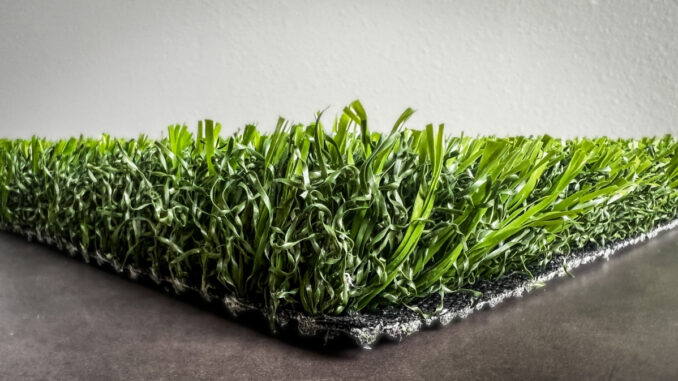
HILLSDALE, N.J.—Borough Administrator Michael Ghassali told Pascack Press on July 22 that a decision had been made to move ahead with a new type of artificial turf called Pivot — an approximate $100,000 increase over traditional turf — for the proposed turf fields and surfaces to be installed at Memorial Field.
Officials are eyeing a presentation in late summer or early fall to present final design plans from Colliers Engineering & Design.
The $5.8 million field upgrade was approved by council March 11 in a 4–2 vote, with councilors John Ruocco and Janetta Trochimiuk opposed. Voting in favor were councilors Robert Colletti Jr., Justin Fox, Melissa Mazza-Chiong, and Clemente Osso.
At council’s July 8 meeting, officials noted that the no-infill synthetic turf known as Pivot, was estimated to cost about $100,000 more than traditional crumb rubber-filled artificial turf.
Ghassali said that a possible donor for an inclusive, ADA-compliant playground may help to mitigate the extra turf costs.
The Pivot turf has a styrofoam backing and a 12-year warranty, officials noted, versus an eight-year warranty on traditional turf. Ghassali told us that the Pivot turf won the day on being potentially less harmful, as well as less messy.
He previously said that traditional turf, backed by crumb rubber in-fill, generally can break apart and often gets tracked all over athletes’ homes via their shoes, uniforms, and body parts such as ears and noses.
According to the company, Pivot turf reduces plastic shedding by nearly 100% because it uses no infill; it is recyclable, has no detectable levels of PFAS, PAHs, or lead, and meets FIFA, NFL, and NCAA testing standards. It also requires no watering, pesticides, or fertilizers.
Borough engineer Nick Chelius previously said they had checked out purchasing co-ops that dealt with both types of turf, depending on what was selected. He said he was not aware of any sharp increases in turf prices, but warned that prices do trend up.
It was not clear if President Trump’s trade tariffs might impact field improvement prices.
Previously, we reported that on June 17 the Borough Council unanimously approved approximately $5 million in bond financing for upgrades at Memorial Field, including a $500,000 bond down payment. Officials previously said the bond ordinance would not increase local property taxes.
Ghassali said the $5.8 million project will be funded without raising taxes, using $1.2 million from the field reserve account and $4.6 million in bonding.
In mid-March, the council split, 3–3, on whether to include field lighting in the initial bid specs. Fox, Mazza-Chiong, and Trochimiuk voted yes; Colletti, Osso, and Ruocco voted no. Mayor Michael Sheinfield broke the tie, voting against lighting but in favor of laying underground conduit for possible future installation.
Chelius then estimated the cost of conduit installation for future lighting at $50,000 to $100,000. He said bollard lights around the walking path would require conduit and electricity.
Late last year, Chelius presented a concept plan that proposed converting Memorial Field to artificial turf and adding facilities for football, soccer, baseball, softball, basketball, pickleball, a walking path, and a playground.
A rendering of the proposed upgrades was available under a Memorial Field Plan link on the borough’s website, alongside the Nov. 13 Colliers Engineering presentation.
The Borough Council on June 17 unanimously approved approximately $5 million in bond financing for upgrades at Memorial Field, including a $500,000 bond down payment, according to Ghassali. Officials said then the bond ordinance would not increase local property taxes.
Ghassali said the $5.1 million total—including $4.6 million in bonds and a $500,000 down payment from Fields Committee funds—brings the borough close to the $5.8 million spending cap the council set earlier this year for Memorial Park improvements.
That cap is expected to be covered through existing resources, including a $500,000 annual tax allocation created about five years ago to fund field upgrades.
